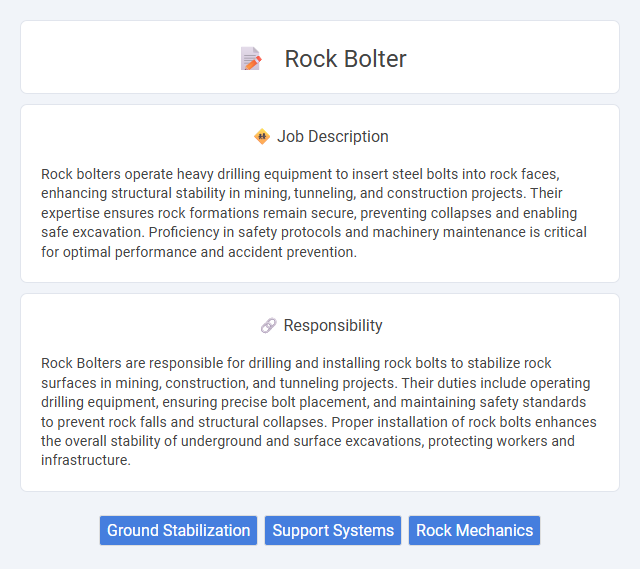
Rock bolters operate heavy drilling equipment to insert steel bolts into rock faces, enhancing structural stability in mining, tunneling, and construction projects. Their expertise ensures rock formations remain secure, preventing collapses and enabling safe excavation. Proficiency in safety protocols and machinery maintenance is critical for optimal performance and accident prevention.
Rock Bolter work likely involves physically demanding tasks in potentially hazardous conditions, suggesting it may be better suited for individuals with good physical strength and endurance. Those who have prior experience or training in mining or construction safety protocols are probably more capable of handling the risks and challenges associated with this job. People who are prone to health issues, lack physical stamina, or have anxiety about confined spaces might find this occupation less suitable.
Qualification
Rock Bolter operatives require specialized training in heavy machinery operation and rock drilling techniques. Proficiency in interpreting geological data and ensuring safe equipment handling is essential for effective excavation. Certification in mining safety standards and physical endurance assessments are critical qualifications for this role.
Responsibility
Rock Bolters are responsible for drilling and installing rock bolts to stabilize rock surfaces in mining, construction, and tunneling projects. Their duties include operating drilling equipment, ensuring precise bolt placement, and maintaining safety standards to prevent rock falls and structural collapses. Proper installation of rock bolts enhances the overall stability of underground and surface excavations, protecting workers and infrastructure.
Benefit
Rock bolters most likely enhance structural safety by securing rock formations in tunnels and mining operations, reducing the risk of collapses. Their work probably increases operational efficiency as stabilized rock faces allow safer and faster excavation. The role may offer steady employment opportunities due to ongoing demand in construction and mining industries.
Challenge
The Rock Bolter job likely involves significant physical and environmental challenges, such as working in confined spaces and handling heavy equipment under unpredictable conditions. There is a probability of facing constant risks related to rock stability and potential hazards like falling debris or dust exposure. Adapting to these demanding situations requires strong problem-solving skills and resilience to maintain safety and efficiency on site.
Career Advancement
Rock Bolter operators can advance their careers by gaining certifications in drilling technology and heavy machinery operation, which increase their qualifications for supervisor roles. Experience in maintaining and troubleshooting rock bolting equipment often leads to positions such as equipment maintenance supervisor or safety officer. Pursuing specialized training in geotechnical engineering applications can further open opportunities in project management or technical consulting within mining and construction industries.
Key Terms
Ground Stabilization
Rock Bolters specialize in ground stabilization by installing rock bolts and mesh to reinforce rock faces and prevent collapses in mining and construction sites. Their expertise ensures the structural integrity of underground tunnels and open-pit mines, minimizing hazards and increasing safety for workers. Proficient in using drilling equipment and interpreting geological data, Rock Bolters play a crucial role in maintaining secure excavation environments.
Support Systems
Rock Bolters operate advanced support systems to stabilize and reinforce underground mining environments. These systems include hydraulic bolting machines that anchor rock bolts into mine roofs, preventing collapses and ensuring worker safety. Integration of automated monitoring technologies within support systems optimizes bolt placement and structural integrity in high-risk geological conditions.
Rock Mechanics
Rock Bolters specialize in stabilizing underground excavations by installing rock bolts that reinforce rock masses, ensuring structural integrity in tunnels, mines, and other geotechnical projects. Their expertise in rock mechanics involves analyzing rock formations, identifying fracture patterns, and determining optimal bolt placement to prevent rock falls and collapses. Advanced knowledge of rock behavior under stress and proficiency with drilling equipment and rock reinforcement techniques are essential for effective rock bolting operations.
 kuljobs.com
kuljobs.com